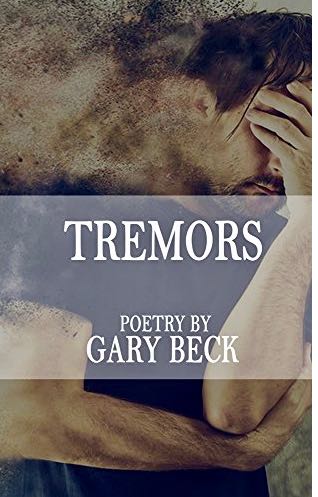Gary Beck, Tremors
reviewed by Alison McBain
reviewed by Alison McBain

Tremors Publisher: Winter Goose Publishing Date: March 23, 2017 Length: 124 pages ASIN: B06XTKGSS4 |
For those of you who have read my reviews for a while, you’ll know that a poet I enjoy reading is Gary Beck. One thing that I think informs his poetry is the breadth of his writing experience: in addition to poetry, he has written plays, he has written essays, and he’s the author of novels and short stories. I hate to bandy around the word prolific, but I think it might fit in this circumstance. This is a writer who doesn’t rest on his laurels.
I’ve reviewed several of Mr. Beck’s collections of poetry, and noted some common themes and an overall leitmotif to his work. Generally, his poetry is dark, sometimes with a nihilistic view of the planet and humanity, based on current trends of pollution, war and consumption.
With humanity destroying itself so actively, what is there to hope for in the future? There are themes of despondence, failure and futility to many of his poems, whether speaking of man’s creations, relationships or achievements. And some of those common themes are to be found in his new collection of poetry, entitled Tremors.
That’s not to say that Mr. Beck doesn’t have a sense of humor in his work, too. There are sometimes lighter moments and wordplay, such as in his first poem of the collection, “Entropy.”
Time speeded up
as I grew up,
though it took a while
for me to notice
and Albert Einstein
further confused me,
relatively speaking,
with theories requiring math
beyond my entropy.
I felt that while there are still poems in the book that keep to the center of Mr. Beck’s more serious message, there is also sometimes a sense of tongue-in-cheek phrasing throughout the works that adds a lighter tone overall and gives the collection a nice sense of balance.
While even the lighter poems might have darker moments, there is a tone of appreciation for the beauty of life and living, even in things that are passing or have passed; a reverence, of sorts, to loss and as a counterbalance to loss, that creates a greater recognition for what remains behind. And some of the poems are lighthearted or end with a feeling of optimism, which counterbalances the darker and more melancholy pieces.
The language is unique, and I often found the imagery inspiring. For example, in “Observatory:”:
My eyes wooed
the telescopic lens,
licking the least particles
of finite observation.
Its white so pure,
pocked by long craters,
bound by soft shadows,
made me think
this was no moon
I had seen before.
This is a moment captured so beautifully that it lingers in the reader’s mind. Yet it is not just a moment, but also the evocation of a feeling of transience, with words such as “finite” and phrases such as “no moon/I had seen before.” The implication, to me at least, is that it is not a question of the moon changing, but the narrator being changed: the moon is constant, but one’s vision of it, of life, of beauty, can change. The beauty is there to be seen; one simply has to see it.
But, as I mentioned earlier, the darker themes running through Mr. Beck’s poetic vision are not ignored, either. He explores these through topics such as the social and political climate of today. For instance, in “Sacrifice:”
I know the children of man,
blind-spilled on the earth
are born to waste,
devoured in crueler seas
by schools of predators,
feeding the bellies of Moloch heirs,
allocated to destruction
in the unprotected birthplace
of pitiless selection,
color, creed, credit card.
I love the cleverness of this imagery. There are several aspects at play here: one is the allusion to and quoting of Biblical phrases. This gives the imagery a certain tone and gravidity that Mr. Beck plays with by substituting contemporary sensibilities to highlight the differences between historical/religious morals versus the golden calves of today’s world.
The poem leads the reader directly to the three “Cs” in the ending line that are divisive topics in today’s world: “color, creed, credit card.” Without expanding on the theme too much, he allows room for a broader interpretation on the reader’s part. The ending packs a punch by highlighting the most relevant modern concerns: racial tensions, terrorism/fundamentalism/religious differences, and the poor versus the rich. But it also allows room for reader analysis.
One aspect I enjoy about reading a poet’s work over time is seeing the progression of his style and what informs his work. I loved how Tremors takes such a wide range of concerns and distills them into often short, succinct poems. Although the majority of the poems are free verse, there is also a great number of rhymed verse. The language is also widely varied: sometimes sparse, sometimes wordy, sometimes vivid or narrative. However, I found the poetry unique, thoughtful and thought-provoking.
I think this is one of Mr. Beck’s strongest collections, and it was a great pleasure to read. I hope you enjoy it as much as I did.
Copyright © 2017 by Alison McBain

